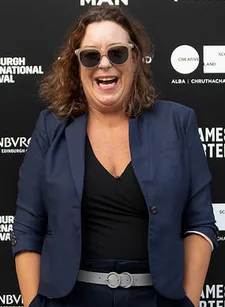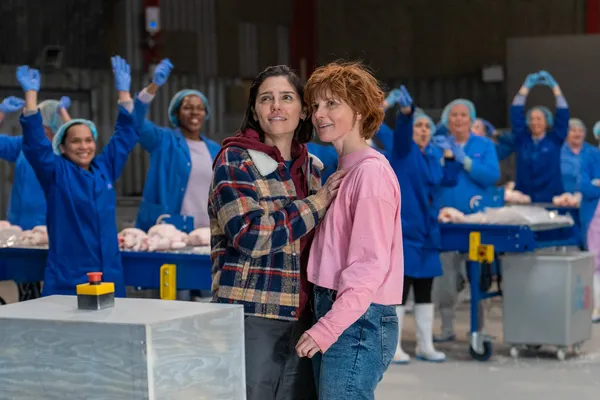 |
| Annabel Scholey and Louise Brealey in Chuck Chuck Baby. Janis Pugh: 'Bel came in and the chemistry between her and Lou was lovely' Photo: Studio Soho Distribution |
Janis Pugh’s Chuck Chuck Baby finally makes it to cinemas this week, almost a year after its world premiere at Edinburgh International Film Festival. It’s generally upbeat nature makes it perfect for a summer release. It charts the story of Helen (Louise Brealey), whose life is at a low ebb. Her spoilt and unpleasant husband Gary (Celyn Jones) has moved his much younger girlfriend into their house, while still expecting his wife to look after his ailing mum Gwen (Sorcha Cusack). She takes refuge among the camaraderie at the chicken factory where she works and allows her emotions to flood out while listening to songs. Pugh mixes the sort of northern humour fans of Victoria Wood and Caroline Ahearn will love with a musical element and a light brush of fantasy as the return of Helen’s childhood neighbour Joanne (Annabel Scholey) brings the prospect of unexpected romance. Pugh finds a way to make the comedy and poignancy work in impressive harmony and shortly before the film premiered in Edinburgh we caught up with her to talk about drawing on her own experience, community spirit and persuading Neil Diamond to let her use one of his top tunes.
Where did you shoot the film?
Janis Pugh: I shot it in Flintshire, which is my hometown. I wasn't meant to shoot the entire thing in my hometown. So the outskirts, like the ship, mushroom mountain are places from my childhood. Cinematically, I always love to go back and shoot there. But I didn't think I was going to shoot in the town itself, which I ended up doing and which was good fun.
Can we talk about the idea of community in your film? You explore that tension between how living in a community or your life can be a wonderfully positive thing in some ways, because people are there for another and there’s a support network, but equally, all your past is continually with you and you can never leave it behind.
JP: No, you don’t, it’s always with you. Growing up in Flint, there was a strong community feel, specifically with women. I was brought up by very, very strong working class women. And I think, for me, that community gave them strength in a way of parenting. I'm one of five kids and for my mom, it was kind of like, shit then, you know, “I'm working nights, what can I do with the kids”, somebody would come across, and we'll keep an eye on them, that kind of thing. But again, everybody knows the secrets, you know, so you don't get away from it in any kind of way. But I go back there, and I've got friends who I have such a cemented relationship with. I don't see them all the time, my life has moved on, their lives have moved on but there's a thread that connects me and still pulls me there quite a bit. And I think, you know, even watching them now going from childhood to becoming grandmothers, there's just incredible support.
This is a very joyous film but there’s a lot of big, negative emotions riffling about under the surface.
JP: It's life. Every town has a Gary, you may not be called Gary, but every small town will have one. The one who kind of was University of Life educated, but never actually leaves anywhere. But also like any other human being, what will happen to us all eventually, is that we lose people we love and it unzips their hearts, and it has to unzip and pull that vulnerability out. And for me, when I talked to Celyn about playing this character, I said there is almost like a child monster within him. He's been spoiled and I don't mean with riches or anything like that. The focus has always been on him. And for me, it's kind of the moment that stops happening that triggers him to become aggressive, because that's all he knows.
You use music as well as film to bring out emotions. When the characters sing along to songs it’s amazing how that immediately keys you in to the emotion. I wondered whether it was difficult both to pick the tracks and to get the music you wanted - did you have any issues with that?
JP: There is a process. I will always start writing a script and I try with all my heart to bring the music in. It's part of my narrative and it's part of the backstory. I am very aware, when I sit down after percolating for probably a couple of months of the story and narrative where I'm going. I put my images down on the wall. I know what characters are going where, and then I start listening to music and kind of okay, what song can I use here, I'm also very aware that we have a very low budget.
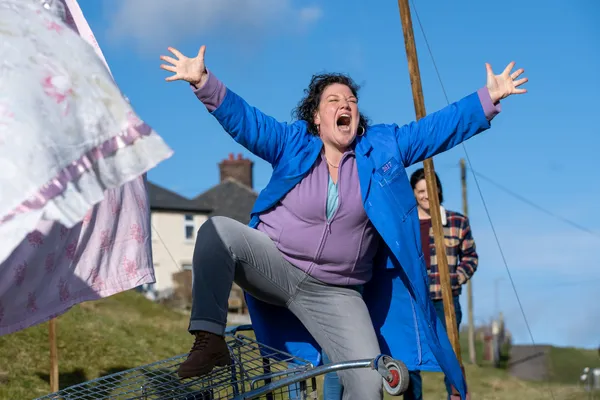 |
| Beverly Rudd in Chuck Chuck Baby. Janis Pugh: 'I will always start writing a script and I try with all my heart to bring the music in' Photo: Studio Soho Distribution |
The one song I knew that I could never get rid of would be the Neil Diamond. Because you feel it when you're writing. And you have to feel it [in the film]. When I talked to Louise and Annabel, about performing the songs. It's very important, they don't sing in a way of performance. It is important for them to feel and understand when you come in, and when you come out, which lines to sing and which lines to belt. So that all starts from the writing process. And then with that song, I wrote a letter to Neil Diamond. I wrote that my mum loved Neil Diamond and I went to see a concert. And she was very sick. I told him I phoned her so she could hear the concert on the phone. So he did give us a bargain for that.
Did you ever work on a factory production line like that?
JP: I worked in the chicken factory? It was the job we all went to from school. It was because it paid well. It was during the YTS time when people would work for £25 a week, and say “I'd rather work in the chicken factory.” I will be honest with you. I'm the baby of five siblings. My sisters were there before me and they were still there. So I think I was probably just hitting my 16th birthday. I had just finished school and you have a meeting at school. They said: “What do you want to do?” I said “I want to be an actor.” And they said: “That's not going to be possible, Janis. You need to have an equity card.” They said: “Look, the chicken factory needs packers.” And off I went.
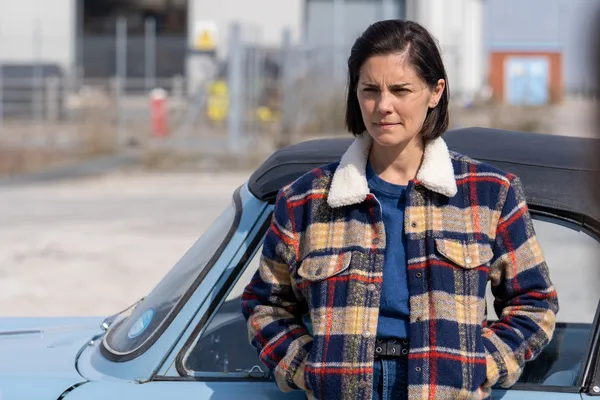 |
| Annabel Scholey as Joanne. Janis Pugh: 'Growing up in Flint, there was a strong community feel, specifically with women' Photo: Studio Soho Distribution |
It was the days when they collected you by bus. That image for me is the bus doors opening, the fag smoke poured out and every one was in their blue hats. I went there and I think I lasted a week-and-a-half. But I can tell you, that week-and-a-half, I walked in a girl and came out a woman. My sisters were there and there was laughter and everybody was singing. That's all they did. I think the album at the time was Meatloaf, they’d all sing Bat Out Of Hell non-stop.When I was casting for extras, there's a Facebook page called Chicko in the 80s. I put it on there and some of the girls turned up. They were just amazing. They all worked in the chicken factory when I was there. They were in the film. I think my tribute to those women is that they are the final women you see in the film, extraordinary, funny and humorous.
I assume there were a few challenges regarding the chickens - given that you can’t throw real ones about.
JP: No, we weren’t allowed to. Caroline Steiner, the production designer, and her team got this lady to make these incredible chickens. When you see Cat Simmons character Clare fling the chicken - that was a hole in one.
There’s a real strain of northern humour going on in this film, the sort of thing that will appeal to fans of the likes of Carolie Ahearn.
JP: The humour is very real. Flintshire is right on the border, so you either sound a little bit Scouse or a little bit Mancunian, you never sound very Welsh because we're like 10 minutes from Chester. The story at the heart of the film is the humour of the women. That's the connection to me, for the audience, they recognise those women. Even though everyone’s wearing blue overalls, and everything's a little bit magical, the heart of all those women is what's going to connect the audience to that story.
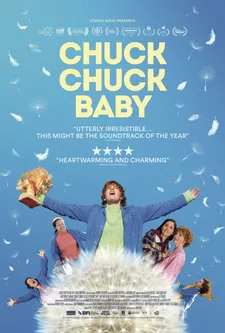 |
| Chuck Chuck Baby poster |
JP: Louise can really reach down into vulnerability. And you, you can see that with her. I sent the script and she loved it. So from that moment, we're on this journey and she knew the singing was involved. Cat, Beverly, and Emily, the three factory girls, have this chemistry which is just unbelievable to me. Bel came in and the chemistry between her and Lou was lovely.
There’s a lot of poetry in this film and notable production design, including usign blue skies quite a lot, in interiors, as well as exteriors.
JP: I love production design. And it's the first thing I start thinking about as well, when I'm doing these images of what a scene should look like. I'm very set on block colours for costumes. And the pastels I use and the kind of the pinks, yellows the blues.
Do you think this is your own self-created genre?
I feel very privileged when people say that. I don't think I could do anything else to be honest with you. My next one is a marriage that is tumbled by the politics of the 80s and there are beautiful 80s tracks we use to tell that story.
Chuck Chuck Baby is released in UK cinemas on July 19











